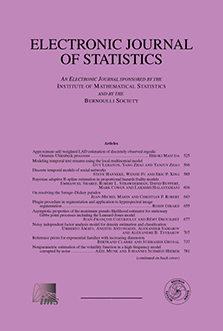Abstract
Mixture models appear in many research areas. In genetic and epidemiology applications, sometimes the mixture proportions may vary but are known. For such data, the existing methods for the underlying component density estimation may produce undesirable results: negative values in the density estimates. In this paper, we propose a maximum smoothed likelihood method to estimate these component density functions. The proposed estimates maximize a smoothed log likelihood function which can inherit all the important properties of probability density functions. A majorization-minimization algorithm is suggested to compute the proposed estimates numerically. We show that, starting from any initial value, the algorithm converges. Furthermore, we establish the asymptotic convergence rate of the $L_{1}$ errors of our proposed estimators. Our method provides a general framework for dealing with many similar mixture model problems. An adaptive procedure is suggested for choosing the bandwidths in our estimation procedure. Simulation studies show that the proposed method is very promising and can be much more efficient than the existing method in terms of the $L_{1}$ errors. A malaria data application shows the advantages of our method over others.
Citation
Tao Yu. Pengfei Li. Jing Qin. "Maximum smoothed likelihood component density estimation in mixture models with known mixing proportions." Electron. J. Statist. 13 (2) 4035 - 4078, 2019. https://doi.org/10.1214/19-EJS1620
Information





